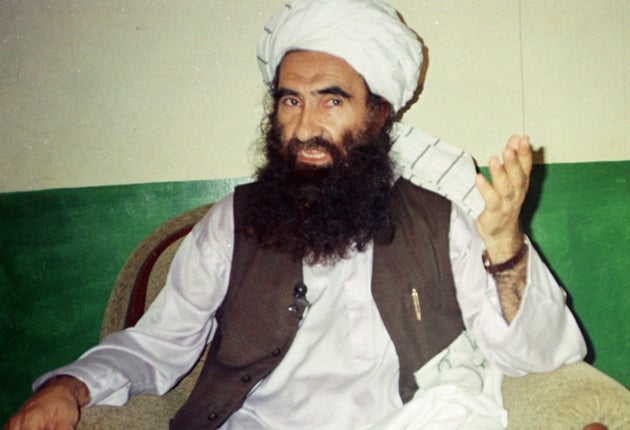Death of Jalaluddin Haqqani will hang over Mike Pompeo's Pakistan talks
Analysis: The death of the founder of the militant network comes at a delicate time in US-Pakistan relations

Jalaluddin Haqqani was a leading Mujaheddin commander in the war against Russian occupation in Afghanistan. He was also the man who recruited Osama Bin Laden into jihad, helped al-Qaeda plan attacks on the west, and founded an Islamist group responsible for thousands of deaths in murderous attacks.
The death of Haqqani, aged either 71 or 72, after a long illness will not change the tapestry of terrorism in Afghanistan and Pakistan, where he was based. He had since long retired, handing over control of the group to his son Sirajuddin. However, his name is in the public domain at a time when the US administration is taking a tough stance with Pakistan for the backing it has given to Islamist extremist groups, cutting funding to the Pakistani military by $300m (£233m).
Jalaluddin Haqqani had been a prime beneficiary of this support, with his group repeatedly accused of acting under the direction of the Pakistani secret police, ISI. The former head of the US military, Admiral Mike Mullen, was just one of a series of senior western officials making the accusation, describing the Haqqani network as “a veritable arm” of the Pakistani secret state.
US secretary of state Mike Pompeo will arrive in Islamabad on Wednesday to hold talks with the government on this issue. The country’s newly elected leader, Imran Khan, was warned in his first call to Washington as prime minister that the US intends to maintain pressure on Pakistan on the issue of terrorist support. The Pakistani government initially denied that the matter had been part of the conversation, but backtracked when the US published a transcript of the call.
In his very first tweet of 2018, Donald Trump charged that Pakistan has rewarded massive US aid with “nothing but lies & deceit”. Plans were announced that month that up to $2bn of aid to the Pakistani military would be suspended by Washington. Pakistan denied being a safe haven for the Haqqani network.
Under Jalaluddin, the network had carried out repeated attacks in Afghanistan. One in 2009 on a CIA base in southern Afghanistan, Camp Chapman, which killed 10 people, was was paid for and organised by the Pakistani ISI, according to the Americans. Pakistan has repeatedly denied the claim. The aim, it was alleged, was to disrupt the hunt for Osama bin Laden, who was later killed by US forces in his hideout at the Pakistani military garrison town of Abbottabad.
The suicide bombing, the deadliest against the CIA in a quarter of a century, featured in Zero Dark Thirty, the Oscar-winning film about the hunt for bin Laden. There is a degree of irony that before becoming a ISI client Jalaluddin Haqqani was a CIA “asset” in the war against the Russians, receiving cash and weapons.
The attacks have continued under Sirajuddin Haqqani, who as well as heading the network is the deputy leader of the Afghan taliban. One of most deadly attacks recently was in Kabul in January, in which 103 people were killed by a bomb placed in an ambulance in the centre of the city.
Join our commenting forum
Join thought-provoking conversations, follow other Independent readers and see their replies
Comments
Bookmark popover
Removed from bookmarks